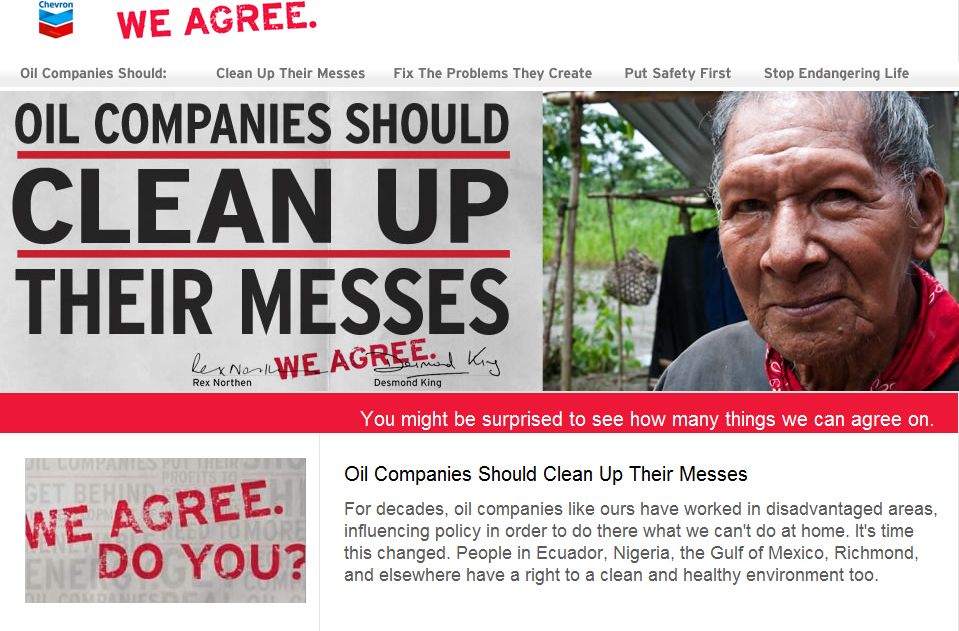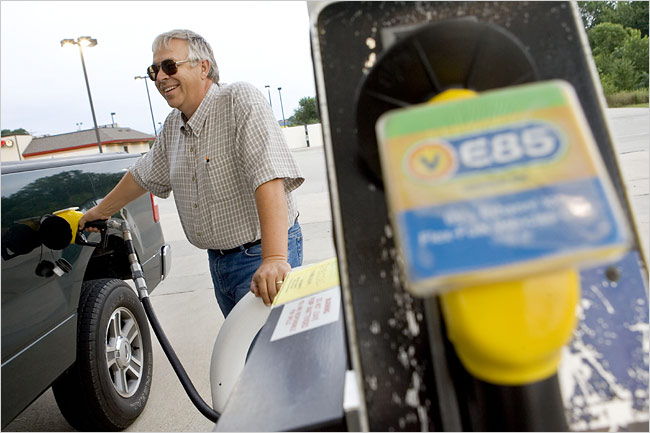 Yesterday, Chevron launched a new advertising campaign called We Agree. According to the company news release:
Yesterday, Chevron launched a new advertising campaign called We Agree. According to the company news release:
The campaign highlights the common ground Chevron shares with people around the world on key energy issues. It also describes the actions the company takes in producing energy responsibly and in supporting the communities where it operates.
Not everyone “agrees” with the new message. Chevron’s new campaign was upstaged by a spoof campaign, which is strikingly familiar but has a different list of values that they “agree” with. Whereas Chevron asks if people agree that “oil companies should put their profits to good use,” the spoof ad says “oil companies should clean up their messes,” adding: “People in Ecuador, Nigeria, the Gulf of Mexico, Richmond, and elsewhere have a right to a clean and healthy environment too.” The spoof press release has a decidedly different tone as well, promising to admit “to abuses that companies usually try to hide.” The fake campaign is in reference to an ongoing lawsuit in Ecuador where Chevron is being tried for $27 billion to clean up oil pollution costs. Chevron calls the suit a fraud.
One of the media outlets that fell for the prank didn’t seem too bitter. “If we had to get punked, we’re glad it was by the Yes Men” wrote David Zax on FastCompany.com. Indeed, it was the Yes Men working with the Rainforest Action Network and Amazon Watch according to a blog post on the Yes Men web site. According to Ad Age, there was even a spoof story placed on a spoof Ad Age web site.
Before their ad campaign had even launched, Chevron was forced to respond to the spoof campaign with the following statement:
Unfortunately, there are some who are not interested in engaging in a constructive dialogue, and instead have resorted to rhetoric and stunts. Today, activist groups have attempted to interrupt the conversation by issuing a fake press release and establishing a counterfeit website, which are not affiliated with Chevron.
To the New York Times, a Chevron spokesperson said “We expected something like this would be done because there are activist groups whose sole focus is attacking Chevron and not engaging in rational conversations on energy issues.” Really? Chevron expected a fake ad campaign would come out just before theirs and create mass confusion? Later in the story, he said he didn’t know who was behind the spoof. Hmm. He also said the company was “taking down the Web sites that purport to be Chevron’s.” When this blog post went live, the web site was still up.
So, why did they do it? In an email from the Rainforest Action Network to the New York Times, they said: “When it comes to oil spills, climate change and human rights abuses, we need real action from Chevron. Instead, the oil giant has prioritized a high-priced glossy advertising campaign that attempts to trick the American people into believing it is different than BP.”
To which, BPGlobalPR said: “Jerks.”




Very good information.thanks.
Great insight.